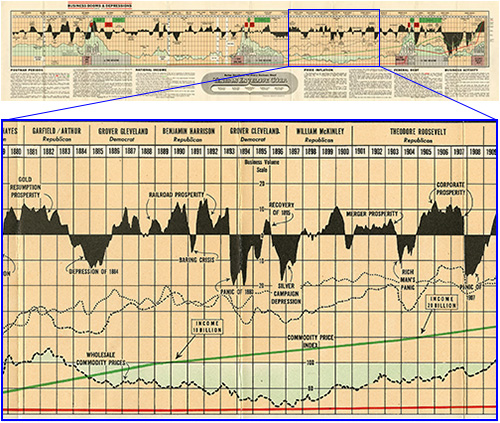Historically, economies have repeatedly undergone periods of expansions or booms, followed by periods of decline, recession, or depression. As stated by Christina Romer, economics professor at the University of California-Berkeley and former chair of the Council of Economic Advisers, “The combination of expansions and recessions, the ebb and flow of economic activity, is called the business cycle.”[i]
This easy-to-read timeline provides a historical perspective of over 150 years (1775-1943) of U.S. economic growth and depressions, including information on federal debt, national income, business activity, commodity prices, stock prices, and bond yields.

Excerpt from Business Booms and Depressions Since 1775: An Accurate Charting of the Past and Present Trend of Price Inflation, Federal Debt, Business, National Income, Stocks and Bond Yields with a Special Study of Postwar Periods. 1943, https://fraser.stlouisfed.org/scribd/?title_id=145&filepath=/docs/publications/1943chart_busibooms.pdf.
Further readings
Burns, Arthur F. and Mitchell, Wesley C. Measuring Business Cycles. New York: National Bureau of Economic Research, 1946; http://papers.nber.org/books/burn46-1.
Fisher, Irving. Booms and Depressions: Some First Principles. New York: Adelphi, 1932; https://fraser.stlouisfed.org/scribd/?title_id=104&filepath=/docs/publications/books/booms_fisher.pdf.
Mitchell, Wesley C. Business Cycles. Memoirs of the University of California. Volume 3. Berkeley: University of California Press, 1913; https://fraser.stlouisfed.org/scribd/?title_id=174&filepath=/docs/publications/books/mitch_buscyc/mitchell_buscyc.pdf.
Many more readings are available in FRASER’s business cycles subject.
[i] Romer, Christina D. “Business Cycles,” in David R. Henderson, ed., The Concise Encyclopedia of Economics. 2008. http://www.econlib.org/library/Enc/BusinessCycles.html.
